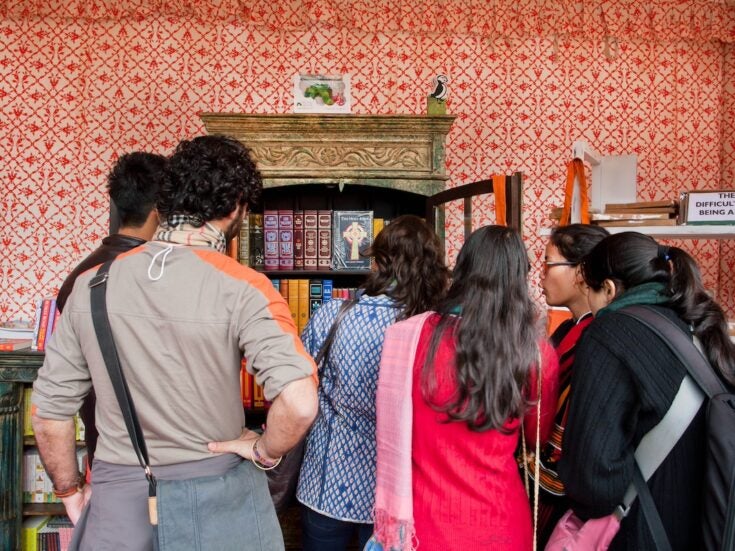
Dead End Gene Pool: A memoir
Wendy Burden
Gotham, 288pp
Buy Dead End Gene Pool in the Spear’s/Amazon store
Review by Christopher Silvester
There is a moment towards the end of Wendy Burden’s scintillating and sardonic memoir of her upbringing that should chill the most vigorous, conscience-salving super-rich philanthropist. Her elderly grandfather, William AM Burden II, suffering from the advanced stages of Parkinson’s disease and with several strokes to his account, finds himself in a hospital of which he has been a stalwart benefactor.
His secretary, Miss Pou (pronounced ‘Pee-yew’) ‘found my grandfather alone, sitting in his wheelchair, naked from the waist down, covered in his own shit. It was caked all over him, the chair, and the floor. The bank of elevators with his name on it was only twenty feet away.’
Indeed, Granddaddy had a thing about elevators. The author describes a visit to an obscure Paris restaurant with her grandparents in the mid-1970s when she is at college. Since Granddaddy never carries cash or identification, the bill has already been taken care of in advance by the vigilant Miss Pou.
Suddenly, Granddaddy starts searching his pockets for a cheque book, then asks his wife if she has any cheques in her pocketbook. Having summoned the proprietor, he tells him that everything was ‘marvellous’ but adds, ‘It’s damned inconvenient to climb the stairs. You need an elevator.’ He then instructs Wendy to write a cheque for $200,000 against her modest Citibank account, explaining that ‘Miss Pou will wire the funds to your account to cover it’. Wendy writes the check, which Granddaddy hands to the bemused proprietor, saying, ‘When I return in the fall, I expect to ride in an elevator instead of taking those infernal stairs.’
Burden is the great-great-great-great granddaughter of Cornelius Vanderbilt, who when he died in 1877 was the richest man in America (and according to a New York Times list a few years back the second richest American ever). But Burden is only concerned to reach back two generations for the simple reason that, following the suicide of her father when she was six, she spent much of her childhood, during her mother’s frequent absences, at her grandparents’ various residences: a Fifth Avenue apartment, a weekend home at Mount Kisco, New York, summers at Mount Desert Island in Maine, and winters at the Jupiter Island Club on Hobe Sound in Florida. It was a world she calls ‘Burdenland’.
Granddaddy was in the aviation business, had served as ambassador to Belgium under Eisenhower, and had hoped to be made ambassador to France under Nixon a decade later. (An ardent Francophile, he made 98 visits to Paris during his lifetime.) He was also a president of MoMA and an avid collector of avant-garde art, but he was ‘strictly Edwardian when it came to his household’ and believed that it was his birthright to have a chef, preferably French, as well as various other servants. ‘To call the servants the “help”,’ he once told his wife, ‘is absurdly euphemistic.’
Wendy’s mother is depicted as a sun-obsessed, cocktail-guzzling hedonist — and a nymphomaniac. She shifts from emotional distance to over-sharing, even telling her teenage daughter through slurred words that she wants a divorce from her second husband, a Ferrari-driving Austrian arms dealer, because he likes to sodomise her. Wendy was an early convert to the macabre (via New Yorker illustrator Charles Addams) and enjoyed decapitating her Barbies in a guillotine. Her tone is darkly humorous.
My only disappointment with this book was the lack of photographs. There are none, apart from three on the dustjacket: one of a grand country house (presumably ‘Florham’, the New Jersey estate of her great-great grandparents, the Twomblys); one of a Twenties flapper in an airplane fancy dress and propeller hat (presumably her grandmother), who is clutching a friendly sea monster; and one of the author in her wedding dress with an arm around the shoulder of her middle-aged mother, who is wearing a printed trouser-suit.
Where are the photographs of Granddaddy, or her eccentric uncles, or her suicide father, or her ‘weird but much adored brothers’? Burden has conjured up such vivid pen portraits of these characters, I yearned to see what they looked like.
Some might find Burden’s book self-indulgent and her bratty adult-through-a-child’s voice too knowing, but I was won over by her tart prose, her prodigious memory for the tiniest detail, and her constant self-mockery. Does she think her selfish mother was a monster? By the end of the book, she has somehow redeemed her.
Although it does not have the wider sweep of Tad Friend’s joyfully funny memoir of declining Wasp values, Cheerful Money (read Spear’s review here), I would recommend it to anyone who enjoys social history or reading about dysfunctional families. I reckon she has more books in her. With this book that belies its own title, the Burden gene pool now includes a writer of acute perception with a talent to entertain.
Buy Dead End Gene Pool in the Spear’s/Amazon store







